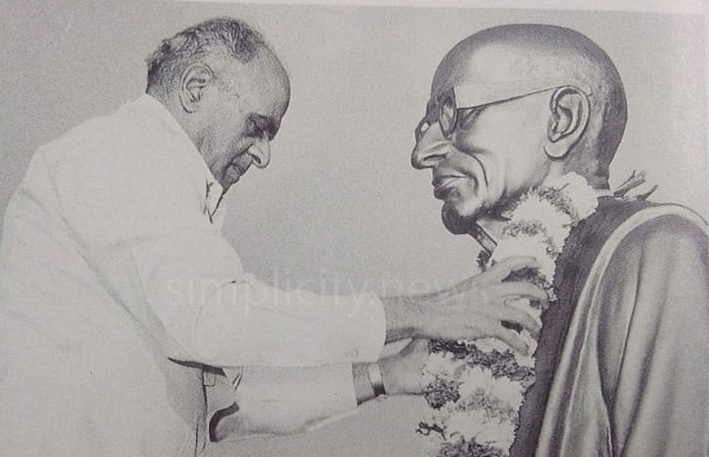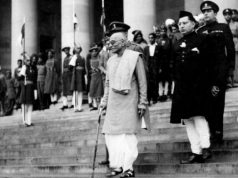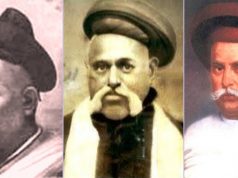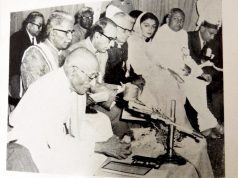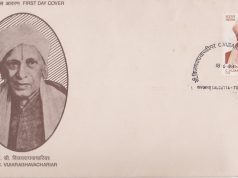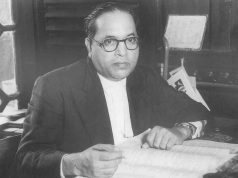The world economy and the health care system are in havoc never seen before after the Second World War due to the speedy spread of COVID19 across the world. In India, few leaders argue with perceptive thinking on the rationale for a complete lockdown of the entire economy by a whip of the Union Government. Industrialist Rajiv Bajaj is one such leader and argues based on certain data analysis which is India centric and has some grain of truths. Bajaj’s open mind and incredible courage to think alternative ways are quite rare at this juncture of impaired moral fabric all across the world. History witnesses that only a few righteous persons could think or take the risk without fear or consequences. Decades ago, we had a few such rare thinkers.
GK Sundaram was one such great thinker and leader from Coimbatore, Tamil Nadu. “He has led a historic life. He was a great visionary and a perfect and righteous person”. He was multifaceted personality contributed immensely to the country’s freedom struggles even at the tender age of 16. He also served considerable time in prison and was a doyen of the Indian textiles industry, builder of many industry bodies for supporting the growth of the textiles sector. He was a tall political leader and a parliamentarian of Swatantra Party, an educationist a philanthropist, and above all, a liberal thinker with a firm belief of economic freedom, individual liberty and equality for all.
GK Sundaram had once unequivocally stated that “Individuals should be allowed to pursue their vocations without let or hindrance – there should be no unnecessary governmental interference. We believe in freedom of enterprise because it is the only system that can uphold and protect individual liberty which is paramount and matters more than anything else”. He was inspired by Nani Palkhivala’s annual post Union Budget speeches and delivered several such post Union Budget speeches in Coimbatore at the “Verandah Club” with humour and stressed on the ills of State control policies of the government.
GK Sundaram was born in 1914 in Coimbatore. He was affectionately called GKS. He completed a course in Textile Technology at Bolton in the UK and returned to join as Manager in his father’s family business in the textile sector in Coimbatore in 1938. His father, a Congressman, G Kuppuswamy Naidu had started business in the textile sector in 1910. For about seven decades, Sundaram was Chairman and Managing Director of Lakshmi Mills Ltd. He was also the Chairman of Lakshmi Automatic Loom Works Limited and the Lakshmi Card Clothing Manufacturing Company. Today, the Lakshmi group has diversified businesses leading in several areas. It also provides free healthcare services to the poor and serves free cooked food with the aim that no one should go hungry in the city of Coimbatore.
Coimbatore is known as Manchester of South India, a long-standing tradition of a manufacturing hub for all kinds of goods and services from agriculture, to industry and the service sector. Much before the economic reforms, GK Sundaram was a pioneer in collaborating with many overseas businesses to produce world-class textile machinery in India and established a diversified and profitable business for his company.
During the freedom struggles and the following socialist command and control regime after independence, GK Sundaram led the growth and development of the Indian textiles sector by introducing new technology in processing and manufacturing. He was behind the promotion of Suvin cotton, an indigenous variety of cotton in the country. It was because of his support, the Extra Long Staple (ELS) variety of cotton was developed in India. He was against price controls and had strongly advocated for a fair price for cotton in India, which was equal to the international market price.
GKS founded and spearheaded several industry bodies to train human resources and also raise voice over ill policies and sensitise the governments. GK Sundaram was the founder and president of the South India Cotton Association from 1978 to 1998. He was the chairman of the Southern India Mills Association from 1967 to 1969 and of the South India Textile Research Association from 1982 to 1998. He was president of the Indian Chamber of Commerce and Industry, Coimbatore from 1962 to 1986; and founder and president of the Coimbatore Management Association from 1955 to 1971 and Wind Power Producers Organisation. He was also the chairman of the Indian Cotton Mills Federation, now known as the Confederation of Indian Textile Industry, from 1973 to 1975.
After involving for several decades of political activism during freedom movements and post-independent India, mostly on liberal principles, Rajaji founded the Swatantra Party in 1959 along with likeminded classical liberals. They had a vision for the country and ventured to effectively counter the socialistic and statist economic policies of Jawaharlal Nehru, who betrayed Gandhi’s vision and aspirations of millions who participated in the freedom struggle.
According to Rajesh Govindarajulu “The Swatantra Party had a number of adherents in Tamil Nadu and in Coimbatore. Saw. Ganesan (Kambanadipodi), B Venkataswamy, Mariswamy, Venkat Rao, VP Kandaswamy, Kovai Subri – the freedom fighter, Kalki Sadasivam, and the freedom fighter industrialist GK Sundaram.” Also, Kovai Khadar Ayyamuthu, R Krishnamurthy, Advocate Sundaram, Gobi Sami Gounder and NA Parasuraman were active leaders in the State. Sundaram was not only attracted to classical liberal principles but was closely mentored by C Rajagopalachari in his political career and thought process. On his 90th birthday, he had reprinted Rajaji’s Speeches rendered as the Governor-General after independence. GK Sundaram was associated with the Swatantra Party from the inception but joined effectively in 1960 and worked tirelessly in order to develop the Party through its ideals.
As a candidate of the Swatantra Party for Coimbatore, GK Sundaram had contested in 1962 parliamentary elections (Lok Sabha) and “worked really hard, and he did not spare efforts in this regard. He was never tired of explaining to the poor and illiterate villagers in simple direct language about what was required to make India shine again. He told them how the ruling elite had failed to destroy poverty in spite of destroying the fortunes of the wealthy of the land. The poor were made to understand why the nation was on the brink.” However, he lost to the Congress candidate of Prof PR Ramakrishnan. However, he did not get discouraged and continued to work for the Party. Rajesh Govindarajulu noted that “Rajaji had felt that if the party had people like GK Sundaram in all the districts, it would have made a very big difference.”
Rajaji had high regard for Sundaram’s leadership skills and abilities; thus, he was nominated as Swatantra Party Member to the Rajya Sabha and served from 3 April 1966 to 2 April 1972. As a member of Rajya Sabha, he actively participated in debates and contributed to the house from the perspectives of liberal principles. Sundaram’s speeches on deliberations on the Delhi Motor Vehicles Act, Gold Control Act, Nationalisation of Banks, Monopolies and Restrictive Trade Practices Act, The Essential Commodities Act, the Unlawful Activities Prevention Bill, etc. were noteworthy and made the government rethink its ill-conceived policies.
GK Sundaram argued that the Gold Control Act “would increase smuggling” and also eventually create “harm to internal security” which was witnessed later until the 1991 reforms. He also vehemently criticised the bank nationalisation. Regarding the MRTP Act, he said that the government aimed to merely to enforce the command and control without the view to provide economic freedom to produce more domestically. He had warned the Union Government that the MRTP Act “could cause a lot of hassles in the long run”, which indeed it did.
He was also concerned about the deficit finance of the Union Government and lamented for the increases in inflation. Further, he drew the attention of the Union Government on the disastrous policies of Industrial licensing, textiles policies, etc. He was of the firm view that “few politicians and bureaucrats” benefited from the socialist command and control economy and not the people of India. One of his maiden speeches said that Lal Bahadur Shastri had taken some bold steps to reverse the adverse trend of socialist control regime but was short-lived.
Nani Palkhivala wrote the foreword to Sathyam Santham Sundaram – A biography of GK Sundaram”(1989), written by A Anandeswaran. The author noted that “When the permit – quota, license Raj laid steel claws on the nation’s economy, GK Sundaram campaigned fearlessly in support of freedom. During his fateful years in the Rajya Sabha as a Swatantra Party member and outside the house, he emphasised and re-emphasised the basic truth that socialism is to social justice what ritual is to religion and dogma is to the truth. He has consistently championed the cause of fruitful egalitarianism in the place of sterile socialism”.
It must be noted that Sundaram had gone out of the usual industrialist’s comfort zone and opposed the Union Government policies openly while pursuing his businesses. This is a rare quality and would not be possible to think without the conviction on certain classical liberal principles with which he strived for the nation-building. According to Rajesh Govindarajulu, during the entire period of six years in the Upper House of the Indian Parliament, Sundaram did not leave a stone untouched. “Sundaram spoke about the issue of poverty and how the introduction of economic policies and new bills did nothing to help in the eradication of the same. He warned that if economic liberties and liberties of other kind get crushed under the garb of an ‘ISM’, the nation and people will suffer in a big manner.”
The South India Cotton Association had instituted a GK Sundaram Endowment Lecture series in memory of Sundaram’s services to the nation. Eminent personalities and scholars deliver lectures on the challenges of the Indian economy. Also, the Indian Chamber of Commerce and Industry, Coimbatore had instituted three awards in the name of GK Sundaram for the services rendered by eminent persons in the field of industries, trade, and services. These awards are given every alternate year. GK Sundaram passed away in May 2009 at the age of 95 in Coimbatore. He had a keen interest in hockey and tennis as well. He was fond of horse riding and rifle shooting.
References:
- LegaCity – The Swatantra Years – From the eyes of GK Sundaram by Rajesh Govindarajulu, January 14, 2020, SimpliCity, Coimbatore https://simplicity.in/articledetail.php?aid=1075
- LegaCity: GK Sundaram – The Swatantra Party ideologue by Rajesh Govindarajulu, June 05, 2018, SimpliCity, Coimbatore https://simpli-city.in/articledetail.php?aid=739
Read More on the Indian Liberal Tradition
Post Disclaimer
The opinions expressed in this essay are those of the authors. They do not purport to reflect the opinions or views of CCS.

